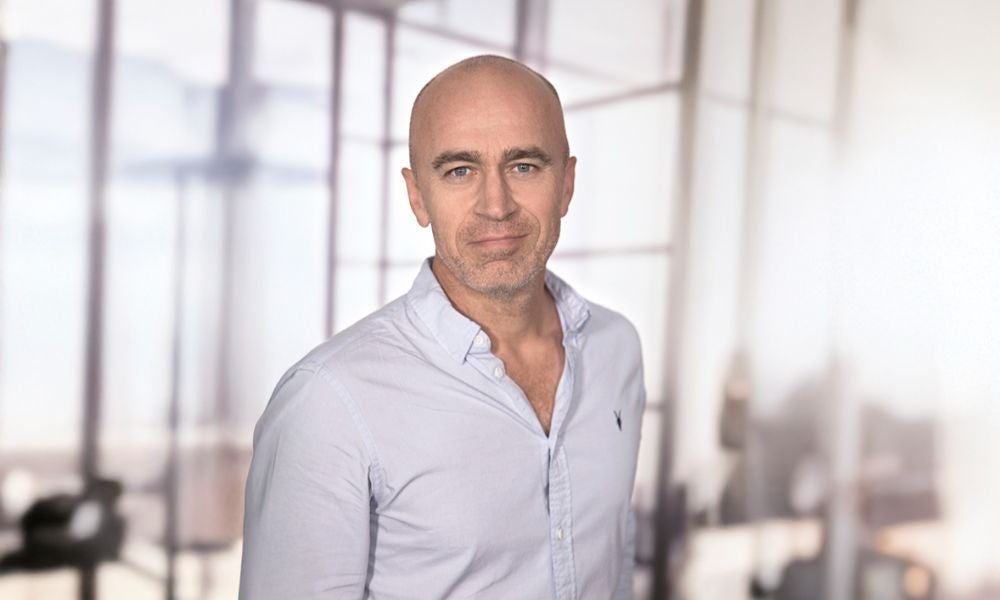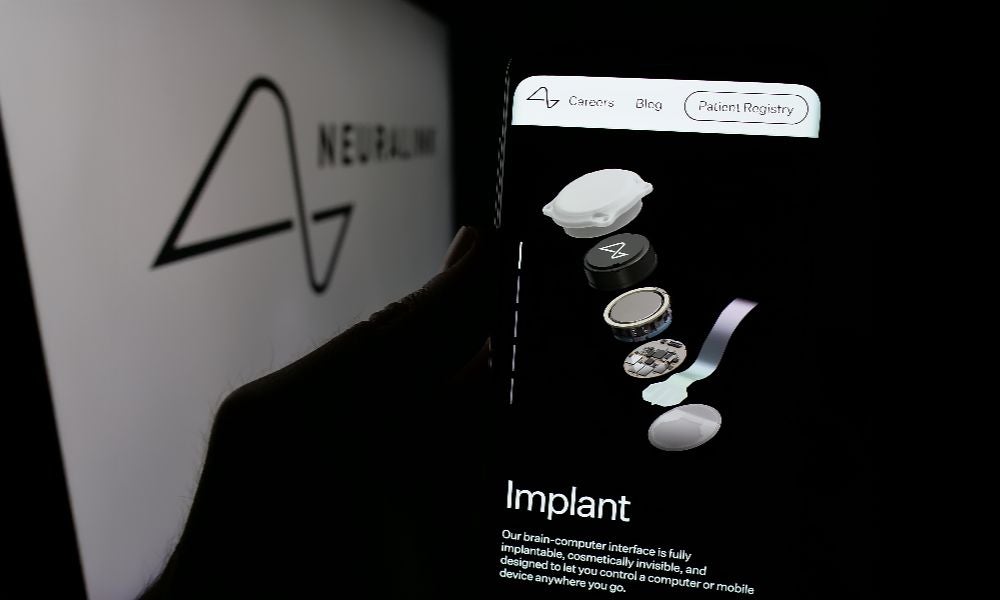Former Facebook CEO on mapping the human brain with AI
Stephen Scheeler, a leading figure in digital disruption across the Asia-Pacific, is leading a healthcare startup using AI to revolutionise mental health
"We're sort of the OpenAI of the human brain. We build large brain models, not large language models.” That’s how Stephen Scheeler, former CEO of Facebook for Australia and New Zealand, and now CEO of Omniscient, describes his latest venture – an Australian-born startup pioneering the use of artificial intelligence (AI) to improve human lives by mapping the human brain.
“The brain is the most complex and important data set in the universe,” he says. “We’re a humble little Aussie startup doing big things in brain AI.”
While much of the world is fixated on machine learning breakthroughs and large language models like ChatGPT, Mr Scheeler’s team is building cutting-edge brain models – using AI to map and decode the brain’s electrical circuitry. “Seven, eight years ago, our technology was impossible. And just as ChatGPT had its moment two years ago, we've been having our moment,” says Mr Scheeler, an AGSM @ UNSW Business School MBA Alumnus.
A TEDx and keynote speaker on topics including ‘the AI odyssey,’ the future of work, and social media, Mr Scheeler, dubbed the digital CEO, advocates for integrating AI with purpose. “We should look harder at many companies and think about what the community service obligation is,” he adds.
As a former executive-in-residence and board advisor to top companies like Qantas, Mr Scheeler is a seasoned voice on the future of business. He recently spoke to UNSW Business School about some key takeaways from his career journey.
AGSM MBA: A strategic fork in the road
Despite being a prominent voice on AI today, Mr Scheeler didn’t begin his career with ambitions in tech or business. His path started in the liberal arts and travelling the world long before landing in the high-powered boardrooms of Silicon Valley. “I was a very liberal arts kind of student; literature, classical music, politics, political science, history, those sorts of things, back when that was a possible career path.”
After graduating with a degree in Asian history from the University of Toronto, Mr Scheeler wasn’t in a rush to enter the workforce. “I lived the Instagram life before Instagram. I travelled for years, several years. I went all over the world, just backpacking and hitchhiking and climbing mountains.”
Eventually, he realised he wanted a new direction. “By the time I reached mid to late 20s, I decided I needed to get a ‘real job’,” he says.
Learn more: How AI is changing work and boosting economic productivity
So, he began considering business school as a bridge to a more practical career, having dabbled in small ventures during his travels and developed a growing interest in business. “I initially thought I’d be a musician, writer, or academic, and had no interest in tech. But over time, I realised business might be a better way to make a living,” he adds.
Mr Scheeler found his professional footing through the MBA program at UNSW’s Australian Graduate School of Management (AGSM). This decision would shape his leadership style and global trajectory as a 21st-century business leader. “I was in Sydney and considering doing a PhD in history at Sydney Uni or an MBA at UNSW.”
Leading Facebook through hyper growth and digital disruption
Soon after graduating, Mr Scheeler started working in management consulting. He got a job at Deloitte, where he gained valuable experience in digital transformation and strategic development. It was also the first time he’d had to buy a suit. “I got a job in management consulting, and that kind of launched me into the world of business,” he explains.
After leading strategy and business development for major Australian companies like Westfield and Lion, Mr Scheeler felt drawn to building rather than just advising businesses. The rise of the internet in the late '90s offered the perfect opportunity. Back then, it wasn’t clear who in a company should “own” the web, so Mr Scheeler volunteered, taking on early e-commerce, websites, and emerging digital tools.

Eventually, he left the corporate world to launch his own ventures, raising venture capital in Silicon Valley. One business failed, but another found success and was acquired. And that experience eventually led to an unexpected call from Facebook. “I had no interest in working for Facebook at first and no idea what I would do there,” he admits. Still, he joined when the company grew to just 1500 people strong.
Over the years, Facebook exploded in scale, reaching a billion users and acquiring Instagram and WhatsApp. Scheeler led the company’s growth across Australia and New Zealand, becoming a key figure in bringing Mark Zuckerberg’s vision to life across the region.
"I was very lucky. I worked with amazing people (smarter people than me), and we had incredible technology. Facebook was a machine, a really amazing machine. It was the halcyon days, what I call the hypergrowth phase,” he explains. “The business was growing like crazy, hiring, driving revenue, and the user numbers were exploding: we passed 100 million, 500 million, then a billion users. We added Instagram and WhatsApp to the mix.”
Mr Scheeler credits his success to being at the right place at the right time. “I was actually the first person over 40 Facebook had ever hired – Mark was in his mid-20s, I was in my mid-40s, and the average age at the company was 23. But being part of that journey was incredibly special. Looking back, it was a unique time. Not many companies have experienced that kind of explosive growth around such a transformational technology.”
Subscribe to BusinessThink for the latest research, analysis and insights from UNSW Business School
As Facebook matured, Mr Scheeler’s role shifted from building to managing, and he began to feel increasingly disconnected. “In the early years at Facebook, I loved what I did – we were building,” he says. “But as the company grew, my role shifted to managing what was already there.”
Becoming a father during this time also forced him to reconsider his priorities. “I didn’t want to be in the office 24/7 anymore. I wanted to be present with my daughter.”
His unease also grew around the broader societal impact of social media. “I remember I was on parental leave the day Trump was elected [in 2016]. That’s when it really hit me: Facebook had built a platform that was going to have so much power to do disruptive things in the world, both positive and negative. And it got me thinking a little bit more about what I really want to do with my life.”
In 2018, Scheeler left Facebook, driven by a desire to build something more “human-centred”. "That’s the legacy I want to leave: using AI to improve the human experience – helping to eliminate things like mental illness and making life better through technology,” he says.
A new frontier: Mapping the brain with AI
In 2018, Mr Scheeler became co-founder and CEO of Omniscient, an Australian startup pioneering connectomics – an emerging field that uses AI to map and decode the brain’s complex network of connections. He co-founded the company alongside Dr Michael Sughrue, a neurosurgeon and Chief Medical Officer, and Dr Stephane Doyen, a data scientist and Chief Data Scientist.

Connectomics is considered to be a serious breakthrough in neuroscience. “Thirty years ago, no one had heard of genomics – now it’s a household name. Connectomics is on the same path, and we’re the world leaders in it,” explains Mr Scheeler. He describes the leap as “akin to comparing Google Maps to an old paper map.”
By decoding brain activity at the circuit level, the startup enables precise, personalised diagnoses and treatment. “Symptoms of mental illness are simply a misfiring of circuits in your brain,” he explains. “If you’re hearing voices due to schizophrenia, we can isolate that to a specific circuit in your brain where the voices are coming from.”
This circuit-level insight makes it possible to tailor interventions to each individual. “Your brain is very plastic. It can be rewired and edited through existing technologies,” says Mr Scheeler. “The big problem with mental illness is that it’s misdiagnosed all the time.”
Using standard MRIs, the startup brings this cutting-edge neurotechnology into real-world clinical settings. Nearly 20,000 people have been treated or diagnosed with the help of its platform, which has been used across some 100 US hospitals. For brain-machine interface companies like Elon Musk’s Neuralink, precise neural targeting is critical. “Neuralink is one of my customers now,” explains Mr Scheeler. “We’re the gold standard.”
Learn more: In the co-pilot's seat: how AI is transforming healthcare
But as optimistic as Mr Scheeler is about AI’s potential, he is also deeply aware of the ethical risks. “There are few technologies that raise as many ethical, moral, existential, and bad actor challenges as AI,” he warns. “The invention of electricity or fire or the motor car… just didn’t have this much stuff tangled around it.”
He says we may need a “marshall plan for AI” to extend the technology's benefits to under-resourced regions: “Let’s make sure everybody on Earth can use it for a price that’s affordable for them.”
To ensure AI benefits everyone, he warns the Australian government should hold companies to higher standards for the public good that go way beyond profit motives: “We [the Australian government] should enforce a lot more community obligations on companies, not just AI companies, but some sort of service obligation where you're obligated to do certain things with your resources or with your technology that you wouldn't normally do as a commercial decision.”
“We should build this technology for the betterment of humanity, not just to make some company more money,” he says.
